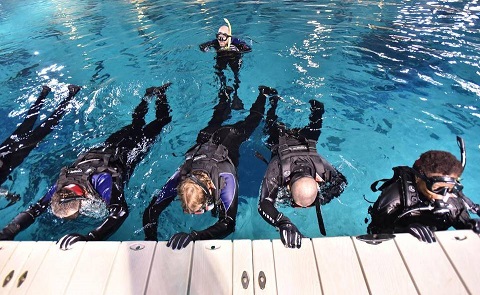How swimming with sharks and whales helps these vets with PTSD find peace
Caption: Divemaster James Beack, back, supervises participants in the Veterans Immersion Program at the Georgia Aquarium on Wednesday, Nov. 9, 2016, in Atlanta.
(Photo courtesy of HYOSUB SHIN Atlanta Journal-Constitution/TNS)
BY BO EMERSON, The Atlanta Journal-Constitution
ATLANTA -- Mike Hilliard was clearing IEDs in central Iraq near Camp Falcon in 2006 when he was shot in the head.
The bullet, from an AK-style rifle, somehow grazed off his helmet. “Only the chinstrap rivet saved my life,” said Hilliard, 32.
Still, Sgt. Hilliard ended up with a brain injury. The stress of that experience stayed with him when he left the military, and he slipped into a “black hole.” He found an unexpected respite when he went scuba diving in the Dominican Republic. “As soon as my head went underwater, it changed my life,” he said. “It took away everything that was on my shoulders.”
Now Hilliard helps other veterans in a Georgia Aquarium program that began in 2008.
Recently, after some instruction from Hilliard, Army veteran Danielle Skoog sat on the edge of a dock with her feet in 75-degree water, and pushed off.
Putting a regulator between her lips, she stretched out, face-down, in the Georgia Aquarium’s 6.3 million-gallon Ocean Voyager pool, while unknown creatures twirled below. Staring and floating, she felt something change inside.
“I lost track of everything, except that there were all these fish around me,” said the 35-year-old brunette, beaming after a half-hour swim in the chilly tank, her hair still beaded with drops of water.
Skoog, who still feels the effects of a traumatic brain injury from when she was in the service in 2004, was one of a group of eight veterans who recently donned wetsuits and took a leisurely float at the downtown attraction, as giant manta rays and sea turtles soared in their midst and playful whale sharks bumped into a chosen few.
The exercise is one among many innovative therapies that are helping servicemen and women overcome trauma and deal with difficult memories. According to the National Center for PTSD, between 11 percent and 20 percent of veterans who served in Operations Iraqi Freedom and Enduring Freedom suffered from post-traumatic stress disorder.
The aquarium also hosts patients recovering from spinal cord injuries.
About 1,600 veterans have participated in what retired Army medic Kathii Ashley describes as “an awe-inspiring experience.”
Ashley, 58, joined the Army when she was a young woman and served with the 54th Engineers Battalion in Iraq. A senior medic, she treated many fellow soldiers as well as civilians; the stress of that time is still very close to the surface. She found the swim at the Georgia Aquarium soothing, but also exhilarating.
“A manta ray brushed against my shoulder,” she said afterward, “and all the adrenaline just, whoosh, rushed through my body because – it’s a manta ray!”
Other veterans reported the same response. They found the experience enjoyable not strictly because it was relaxing, but also because it was exciting.
“It allows the chemicals in your body to start firing again,” Hilliard said.
“A lot of us are a bit of adrenaline junkies,” he added. “You take somebody who’s never dove before, put them in the water, tell them to breathe underwater, that’s an adrenaline thing right there.”
The biggest rush for some of these swimmers was floating alongside the 10-ton whale sharks. “I’m 6 foot, 230 pounds. I’m a big guy,” said veteran David Singleton, standing at the edge of the pool as the silent giants glided past. “But maybe I’m not so big. If you don’t believe in God, go down there. It will change your perspective.”
These veterans were part of the Wounded Warrior Project, but other organizations also send veterans to the aquarium for immersion therapy, including the Veterans Affairs medical centers in Atlanta and St. Louis.
Vanessa Chaney, watching from the underwater acrylic tunnel as her husband floated above, was tentative about seeing those big fish circling the divers.
Her husband, David, also had reservations. “He was just hoping that the sharks had already been fed,” she said with a smile. (Whale sharks eat mostly krill and plankton, so her husband was safely off the menu.)
Chaney, 33, who was hit by improvised explosive devices in Afghanistan in 2010 while on patrol with the Fifth Stryker Brigade, has been through dangerous situations. This wasn’t one of them. “It was very relaxing, very therapeutic,” he said.
Despite the large monsters lurking around them, the dive gave these swimmers a feeling of safety hard to find elsewhere. Hilliard said that’s because the environment is so alien as to be completely unrecognizable.
“As we walk around on earth, on dry land, there’s always something that will remind you of something bad that happened. You see a piece of trash in middle of the road, and you think, IED. But while you’re in the water, you don’t have any of those triggers,” he said. “There is nothing there to remind you of all the bad things you’ve been through and seen. It lets them realize they can drop their guard for a little while.”
Susan Oglesby is a certified recreation therapist and is in charge of dive immersion at the aquarium. “When you look down, and 8 inches from your nose is a 20-foot shark, you think they’re thinking about IEDs? Or their mortgage? No. That’s what’s so therapeutic about it.”
Skoog, who was all smiles after the swim, said she had one more goal: “I want to take some of that calm home with me,” she said. “I want to make it last through traffic.”
